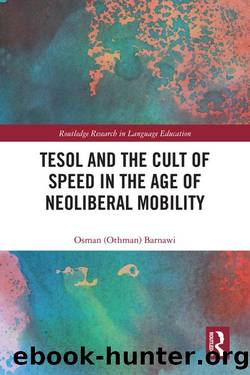TESOL and the Cult of Speed in the Age of Neoliberal Mobility (Routledge Research in Language Education) by Osman Z. Barnawi

Author:Osman Z. Barnawi [Barnawi, Osman Z.]
Language: eng
Format: epub
ISBN: 9780367264611
Publisher: Taylor and Francis
Published: 2020-02-09T17:00:00+00:00
Public higher education bodies with accelerated business-driven mentalities
Generally speaking, HE institutions located in an intense area like Manhattan, the economic and administrative center of New York, are expected to âserve the demands of the knowledge economy, embrace business culture and market ideology, and reshuffle [their] institutional complexity according to models of corporate organizationsâ (Vostal, 2016, p. 143). As the findings of this study revealed, the will to engage in a sort of global business (for instance, recruiting international students) is governing the operational infrastructure of both College A and College B. Even though these colleges are classified as public HE bodies funded by New York State, they have depended on private donors as well as on contributions by alumni since the 1970s. College B âis very grounded in the New York communityâ (Sue) and College A âis a public serving institutionâ (Ana).
For instance, as an institution that offers nearly free tuition and is mainly intended to serve the New York community, College B âhas always been designed to serve the students of New York who would not otherwise be able to get an education. And it is still incredibly affordable compared to most American universitiesâ (Sue). However, the accelerated business mentalities possessed by both colleges have brought about inequalities, intense competition for profit generation, and a lack of serious learning (in the case of College A) as well as ethical, academic, and professional challenges (in the case of College B), as shown in the following paragraphs. Ana told us that her college has been devising a variety of strategies to compete in the global HE industry, including establishing a partnership with brokers. Ana was very critical of the effects of the accelerative practices on students and on her college as a whole.
Our college has recently signed a contract with an entity called Navitas. I forget what it stands for. But it is basically a global broker that helps universities to recruit international students. This organization also connects students to different universities that they would like to go to and provides services for students to help them adjust to new university life. So I am part of the committee which is trying to prepare the courses for it.
I know our college is really trying to catch up in the global education business. But I have been very critical of it. Here in Manhattan we already have a problem supporting domestic multilingual students. But now we are bringing in international students through global brokers like Navitas. So we are very skeptical and concerned about how such a program can work when we are not even fulfilling the needs of our domestic students. In my view this is a sort of contradictory practice. We have been seeing a slow but steady increase in the number of international students. Currently, our college wants to bring in more international students because they want more enrollment and more tuition in collaboration with Navitas.
Yes, all the students are in this system of accelerization here, but with regard
Download
This site does not store any files on its server. We only index and link to content provided by other sites. Please contact the content providers to delete copyright contents if any and email us, we'll remove relevant links or contents immediately.
Spare by Prince Harry The Duke of Sussex(5170)
Navigation and Map Reading by K Andrew(5147)
Tuesdays with Morrie by Mitch Albom(4762)
Machine Learning at Scale with H2O by Gregory Keys | David Whiting(4287)
Cracking the GRE Premium Edition with 6 Practice Tests, 2015 (Graduate School Test Preparation) by Princeton Review(4266)
Never by Ken Follett(3924)
Goodbye Paradise(3794)
What It Really Takes to Get Into Ivy League and Other Highly Selective Colleges by Hughes Chuck(3735)
Fairy Tale by Stephen King(3361)
Harry Potter and the Prisoner of Azkaban (Book 3) by J. K. Rowling(3343)
Pledged by Alexandra Robbins(3167)
Kick Ass in College: Highest Rated "How to Study in College" Book | 77 Ninja Study Skills Tips and Career Strategies | Motivational for College Students: A Guerrilla Guide to College Success by Fox Gunnar(3108)
Reminders of Him: A Novel by Colleen Hoover(3066)
A Dictionary of Sociology by Unknown(3060)
Sapiens and Homo Deus by Yuval Noah Harari(3054)
The Social Psychology of Inequality by Unknown(3011)
Graduate Admissions Essays, Fourth Edition: Write Your Way into the Graduate School of Your Choice (Graduate Admissions Essays: Write Your Way Into the) by Asher Donald(2902)
Will by Will Smith(2894)
Zero to Make by David Lang(2773)
